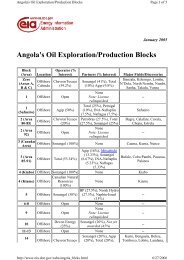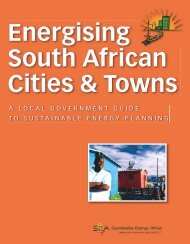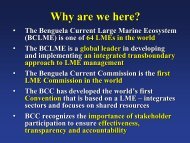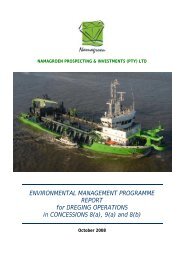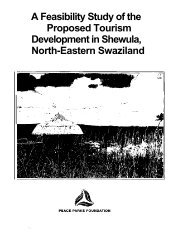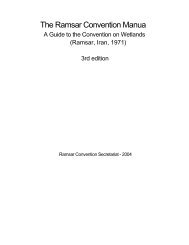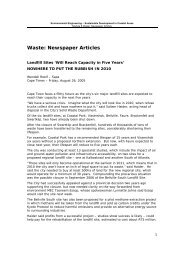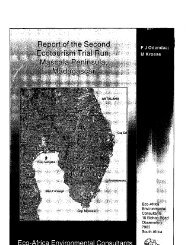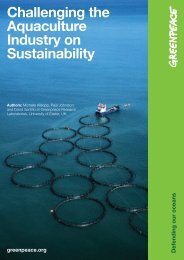Full report LR.pdf - DLIST Benguela
Full report LR.pdf - DLIST Benguela
Full report LR.pdf - DLIST Benguela
- No tags were found...
Create successful ePaper yourself
Turn your PDF publications into a flip-book with our unique Google optimized e-Paper software.
NACOMA Project – Preparation PhaseAnalysis of the Institutional Capacity in the Namib Coast Regional Councils• To mitigate the cost implications of the proposed appointment, for a transitionalperiod during the implementation of NACOMA there could be one EnvironmentalSpecialist for two regions. MET could draft a job description early on duringNACOMA implementation for this position in consultation with RegionalCouncils.The above points that came out of the workshop were amalgamated with the insightsgathered by the writers during numerous one-on-one meetings, smaller group meetings,<strong>report</strong> findings, and proceedings from the workshops held during the PDF A Phase toproduce the concise SWOT analysis presented in Table 4.Table 4 further provides an analysis of the interventions that are recommended in thecontext of the NACOMA Project to address current weaknesses and threats as well as toseize strengths and opportunities and it thus forms a basis for the Programme forInstitutional Strengthening and Capacity Building presented in Section 6 of this <strong>report</strong>.Table 4: SWOT Analysis of the Regional CouncilsNo. Category1 Strengths1.1 Political will and support for goodgovernance and decentralisation1.2 Hands-on knowledge of regions e.g.cultural practices1.3 Established linkages with RDCC’s,RDC’c, LADC’s, SDC’s, etc1.4 Close alliances with key supportstructures, e.g. NGO’s, CBO1.5 Local community participationmechanisms exist1.6 Appointment of management staff inRegional Councils (see Figure 2,section 4.4)2 Weaknesses2.1 Limited understanding of biodiversityconservation planning and managementamong stakeholders2.2 Non-existing function and capacity forbiodiversity conservation planning andmanagement in Regional Councils andlocal communities2.3 Unclear roles and mandates of lineministries in decentralisation process2.4 Limited co-operation and co-ordinationamong stakeholdersIntervention1.1 Encourage good governance as a route to betterlife for all1.2 Assist in research and knowledge managementsystems1.3 Enhance Regional Council structures toimprove coordination and linkages1.4 Capitalise on synergies and strengths ofpartners1.5 Encourage local community engagement inenvironmental planning and management1.6 Provide training programmes to enhanceenvironmental planning and managementcapacity2.1 Promote training, education and awarenessraising programmes as well as field trips2.2 Develop appropriate capacity, e.g. funding‘Environmental Planner’ position duringproject duration2.3 Have role-players workshops to clarify roles ofdifferent parties2.4 Improved coordination through sub-ICZMcommittees, RDCC’s, etc.27



